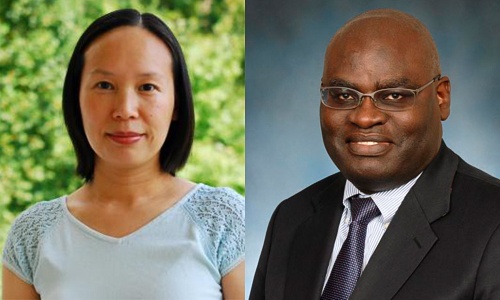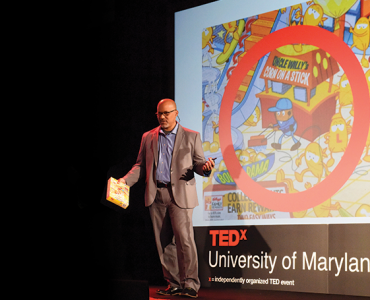When faculty members from the University of Maryland, Baltimore (UMB) and the University of Maryland, College Park (UMCP) wanted to assemble an interdisciplinary team of researchers to study vaccine hesitancy among the African American community, there was no doubt that such a collaboration would work.
“Many of us at both universities who have interacted see us as belonging to one institution,” said Clement A. Adebamowo, BM, ChB, ScD, professor of epidemiology and public health at the University of Maryland School of Medicine’s (UMSOM) Institute of Human Virology. “Yes, there may be administrative things each person has to sign off on at their own institutions, but it doesn’t look any different than two people in different departments working together at the same university.”
The collaboration between UMB and UMCP is the byproduct of the University of Maryland Strategic Partnership: MPowering the State, which was established in 2012 and formalized as part of the University of Maryland Strategic Partnership Act of 2016. In Fiscal Year 2019, UMB and UMCP together garnered nearly $1.1 billion in research and development spending, placing the University of Maryland 14th nationally and eighth among all public institutions in the National Science Foundation’s Higher Education Research and Development (HERD) survey.

The HERD survey is recognized as the preeminent measure for higher education institutions engaged in sponsored research. In Fiscal Year 2018, reporting as separate institutions, UMCP and UMB ranked No. 47 and No. 55, respectively. With this new ranking, Maryland joins an elite group of six states with more than one university conducting research at or above $1 billion per year.
“Our University of Maryland research enterprise provides the opportunity for us to engage in exciting new areas of research that combine the strengths of experts in Baltimore and College Park to take on the world’s greatest challenges,” said Laurie E. Locascio, PhD, MSc, who was appointed to lead the joint enterprise as vice president for research in 2018. “This ranking reflects our status as a thriving and powerful research engine.”
A Broad Range of Research Collaborations
The MPower collaboration conducts advanced research in a broad array of fields including police-community relationships, neuroscience, virtual and augmented reality, biomedical devices, data analytics, and the opioid epidemic. The partnership has created more than 20 academic collaborations, a successful joint tech transfer and commercialization office, and programs and centers including the Institute for Bioscience and Biotechnology Research, Maryland Blended Reality Center, Center for Brain Health and Human Performance, and SAFE Center for Human Trafficking Survivors.
Recent cross-institution research initiatives include responding to COVID-19 and the threat of future pandemics. The teams are addressing the crisis from multidisciplinary angles including medicine, engineering, pharmacy, and social and behavioral science. In addition to the vaccine hesitancy research led by Adebamowo and a UMCP colleague, scientists are working to develop new rapid COVID-19 testing methods and to better understand the SARS-CoV-2 spike protein.
“The speed with which we have established collaborative research teams to address challenges imposed by the pandemic is a powerful statement about the effectiveness and impact of our joint research enterprise,” said UMB President Bruce E. Jarrell, MD, FACS. “We are leveraging the expertise of virologists, physicians, and pharmacologists in Baltimore with computer scientists, epidemiologists, and molecular biologists in College Park. Together, we are addressing today’s urgent needs as well as the challenges of the future.”
Adebamowo sees all the collaboration in laboratories, classrooms, and communications. For the vaccine hesitancy study, he accepted an invitation to work with Xiaoli Nan, PhD, MA, professor and co-director of graduate studies in the Department of Communication at UMCP, for their second project together. The study aims to understand why African Americans, who suffer disproportionately from the adverse health and economic impacts of the pandemic, might accept or reject the COVID-19 vaccines. As a first step, a questionnaire was developed to assess vaccine hesitancy in the Black community. The survey was completed this spring, and the data is being reviewed in advance of a preliminary report.
Nan is a health communications expert, serving as director of the Center for Health and Risk Communication, which includes students and faculty collaborating from College Park and Baltimore. Adebamowo, who also is the associate director of the University of Maryland Marlene and Stewart Greenebaum Comprehensive Cancer Center’s Population Science Program, brings genomics and infectious disease knowledge to the project, which in September 2020 received $98,432 in seed grant funding from MPower’s Joint Steering Council.
The team was rounded out with a professor from UMCP’s School of Public Health and another UMSOM faculty member who had interacted with patients on the front lines during the pandemic.
“All of those skills together really make our team incredibly strong,” Nan said. “Also, because our project is based on African American acceptance of the COVID-19 vaccine, our colleagues in Baltimore have done a great deal of research among African Americans. Their experience with this minority population is most important to this project.”
Charles Schelle and Alex Likowski contributed to this article.




